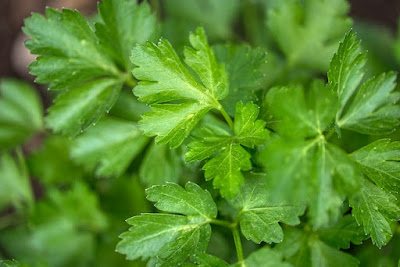Image by Fuzzy Rescue from Pixabay
Our predecessors also made a broth of hot peppers for the same purpose. That doesn’t sound very appealing, so I think I’ll forgo the peppers. I could try a cough syrup from mullein leaves though, as this HHH blogger mentions.
Mint has been ever popular for its soothing effects (which is why I love my Sleepytime tea), and it’s an aid in preventing nausea and kidney stones. It’s also supposed to help with swelling and inflammation—good to know for lots of reasons.
Funny aside: A couple years ago, after I’d had some surgery and was given a powerful pain reliever, I accidentally mixed up the pain reliever with my weekly RA medication of which I was assigned eight tablets, once a week. I usually only took four at a time on that day…thankfully! Yes, I took four of those ONE-ONLY pain pills and got verrrry sleepy and nauseous. I called the poison hotline, and while they didn't think I was likely to keel over, they urged me to have someone sit with me and help me stay awake. My hubby was at work, and I didn’t want to panic him (for which he scolded me later) but my daughter and son-in-law came to sit with me until the effects wore off. Guess what I drank while they were here? Yep, mint tea. It did soothe my upset tummy!
Some home remedies were meant to be used as preventatives. Spring tonics were made up by women in their homes to prevent the seasonal ailments we all know today. When I read about what went into some of those tonics, everything from sarsaparilla (seemed to be a common one) to burdock, sassafras, cherry, and dogwood bark—just to name a few of the ingredients—I could only admire the pioneers’ determination to stock their medicinal chest. Different concoctions of these ingredients were boiled up into a sort of syrupy liquid before being added to whiskey and doled out a spoonful at a time, several times a day, to the woman’s family. Most of those ingredients I’d be hard pressed to find, especially in northern Wisconsin, but if I was a pioneer, I can definitely imagine myself stirring up my botanicals over the cook stove.
I have dried my own raspberry leaves (high in vitamins and antioxidants) and dandelion (preventing bone loss, liver damage, and high blood sugar) and a few things as preventatives like that. It's said that boiled parsley can ease a child’s fever (and supposedly help with jaundice, and gall stones). Hm… I have a parsley plant about to end its season, and I already treat parsley like it's the seasoning to end all seasonings. Maybe I’ll boil it and give the ibuprofen a break.
Image by Gabriele Lässer from Pixabay
Mold from fruit was used to treat skin infections—but of course! I’m sure that’s why the idea for penicillin seemed a somewhat obvious study to Alexander Fleming.
This could become an extensive blog post, but posts on home herbal remedies abound, so I won’t go on, plus I’m sleepy and I need my box of tissues. There are entire books written for hobby herbalists. Even when writing fiction, I get a little overwhelmed with the choices and study of what my characters might have used to treat an ailment or injury.
What about you? Do you have home remedies you stand by? What’s the most outlandish you’ve come across? Do you enjoy reading about them in fiction? Writers, have you done some research in this area? I’d enjoy hearing about it.
Naomi is a multi-published author whose great love is historical fiction. She will have three new books releasing in 2022. Song for the Hunter and the Lumberjacks and Ladies collection are now available for pre-order. Readers are urged to sign up for her newsletter so they don’t miss a single update on new fiction (or the occasional free read).
Naomi is at home in the Northwoods with her husband Jeff near their adult children and ever-expanding passel of grandchildren. Visit her website and find her newsletter sign-up form at https://naomimusch.com/
Mark your calendars: Naomi’s novel The Black Rose will be offered FREE November 5th, 6th, and 7th.
When Jesilyn Beaumont betrays her twin in the worst possible way, a fall from grace leads her to a boom town where the living is hard and dangerous. Can a lumber camp preacher rescue her from a life of shame, and will her sister ever be able to forgive?






A fascinating post. My sister-in-law is very knowledgeable about the various teas and infusions with medicinal properties, and we've availed ourselves over the years, but I can't remember specifics. However, we swear by ginger to help with aches and pains and upset stomaches. Ginger tea, ginger ale, ginger "gummies," grated ginger root in food just to name a few.
ReplyDeleteGinger does seem to be a long-standing go-to. I had some ginger tea yesterday. Can't say it's my favorite, but I figured it help me out.
DeleteThanks for posting! Dedication is doing it even when you don't feel well, so double thanks for that. My favorite home remedy is honey mixed with lemon juice and warmed up a bit, used as a cough suppressant especially effective on that annoying cough that comes with postnasal drip and sets in just as you try to sleep.
ReplyDeleteYes! That's one I offer to my grandkids sometimes, especially if their folks don't want them taking any actual medicines. Very comforting.
DeleteI love to use home remedies. And I found a couple new ones in your post, Naomi, so thank you!
ReplyDeleteAne, your characters must use a lot of these things, eh? ;)
ReplyDelete